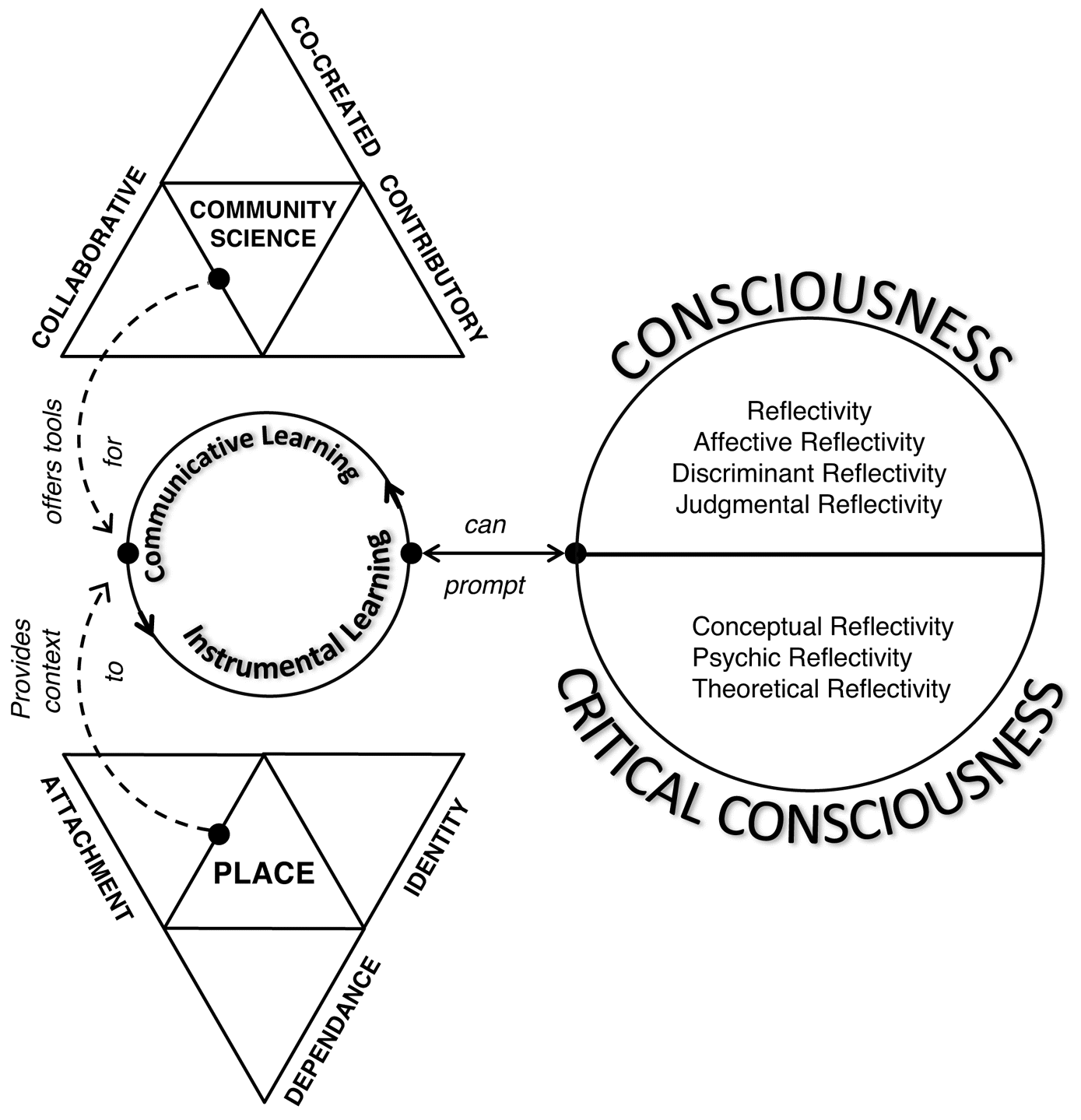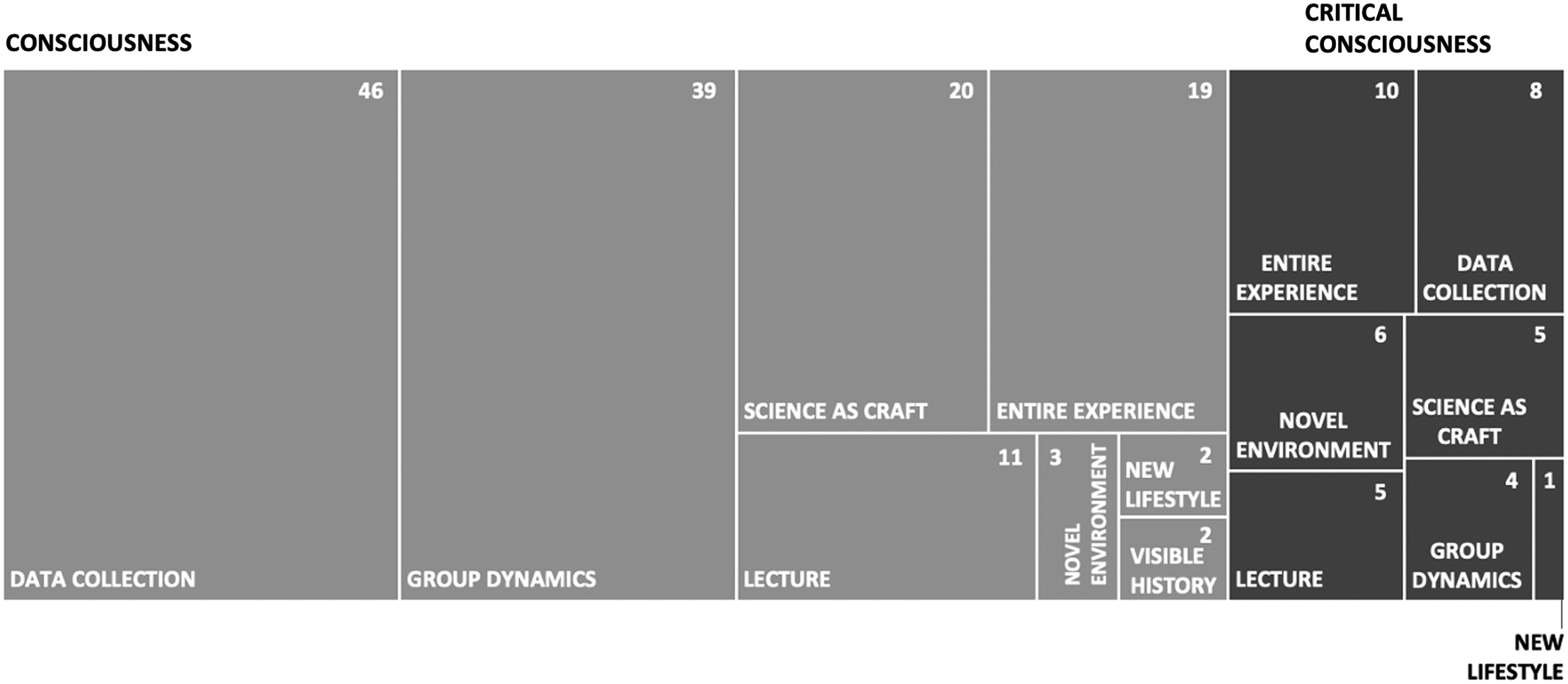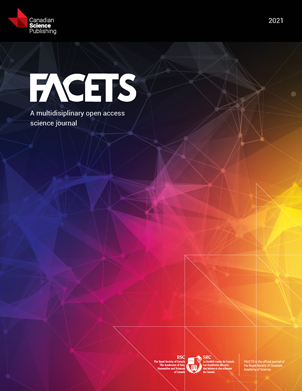Place and transformative learning in climate change focused community science
Abstract
1. Introduction
2. Research context
2.1. Community science and transformative learning
“the emancipatory process of becoming critically aware of how and why the structure of psycho-cultural assumptions has come to constrain the way we see ourselves and our relationships, reconstituting this structure to permit a more inclusive and discriminating integration of experience and acting upon these new understandings”.

2.2. Place as a platform for perspective change through community science
3. Methods
3.1. Mixed-method approach
3.3. Interviews with participants
| Level of reflectivity | Description |
|---|---|
| Consciousness | |
| Reflectivity | The participant becomes aware of a specific perception, meaning, or behaviour of their own and they are able to verbalize new experiences and perceptions. |
| Affective reflectivity | The participant is aware of the way they feel about their perceiving, thinking, or acting in the situation. The participant is aware of other participants’ feelings. |
| Discriminant reflectivity | The participant assesses how they managed in their practice. Assessment of the efficacy of perceptions, thoughts, actions, immediate causes. The participant identifies discrepancy between what is planned and what really happens. |
| Judgemental reflectivity | The participant becomes aware of value judgements made by them and colleagues as well as the inconsistency this can bring to practice and actions. |
| Critical consciousness | |
| Conceptual reflectivity | The participant assesses the adequacy of the concepts they use to understand environmental issues. The participant begins to question whether the concepts they use are adequate for making sound judgements and to identify what else they need to know and learn to understand and act in the situation. |
| Psychic reflectivity | The participant recognizes the habit of making precipitant judgements about environmental issues based on limited information. |
| Theoretical reflectivity | The participant becomes aware of why one set of perspectives is more or less adequate to explain personal experience and moves towards those that best fit the situation. |
3.2. Matrix review of existing programs
4. Results
| Form of reflectivity | Participants/instances | Example participant comments |
|---|---|---|
| Consciousness | ||
| Reflectivity | 15/47 | I think what surprised me a little bit—I come from… a world of words; I’m an attorney. So, you know, my day is trying to avoid numbers. But—try to twist the facts, and all those things. But, interesting to me is that the one set of… data that is collected can be utilized and dipped into by so many different projects. And so many different things… that might not even be contemplated at the time.—Alex |
| Affective reflectivity | 16/48 | Now that I know [what] I’m doing… so now I feel I’m, I’m good at it. But it made me good. Because like, one of the last days that we were there, one of the… I don’t know, she’s a student that’s up there for the summer that’s doing assisting. She was like, ‘hey can you come with me and, and help me do this’? And I was like, ‘me? Do this? Me?’ I was very proud of myself. So it was a neat experience.—Alyana |
| Discriminant reflectivity | 15/40 | It really helps me realize that even though I’m just a girl in Springfield, and I’m a history teacher, that I can have an impact? And if I can show other people? That’s just as important as me … making sure that I don’t use too much electricity, making sure that I use my recyclable…. That, you know, all the things that I always knew were good for the environment.—Alyana |
| Judgemental reflectivity | 12/30 | I guess because of replications, a lot of that will be washed out. But just thinking about how we did some of the things, it wasn’t particularly random. Which I think is probably an ideal piece of this puzzle. The sampling of the ponds, sometimes [especially on a long day]: “well, where did you sample? well, where it was convenient.” Where muck wasn’t going to go up to your knees.—Charlie |
| Critical consciousness | ||
| Conceptual reflectivity | 12/23 | It’s come up most often in the context of… the rebuttal argument that seems to be the most common one that I hear, which is, “we’ve had these cycles before. They don’t mean anything. It’s just the cycle.” And to be able to say, “you know what? There are a couple of really interesting charts and graphs that I’ve seen, and that I saw, that will show you maybe why that’s… not quite case. You’re absolutely right—there are cycles.” But to take… the part of that statement that is true and show how it’s still a conclusion that’s not what we’re in. And be able to back that up with, you know… “here’s the CO2 graph. And, and oh let me tell you why you have the cycles—that’s because of the tilt, wobble and roll of the earth that we learned about.” And taking all those bits and tiny pieces and understanding really how some of that whole system functions.—Navdeep |
| Psychic reflectivity | 3/4 | We were expecting, on the end of things [on the end of the research] there will be something tangible behind us saying, “ok, so we now know that tree line is doing this and that because of this and that. And there is an influence here.” While in fact actually this is a data collection that actually needs to go for the next 50 years to actually being able to interpret something.—Dae |
| Theoretical reflectivity | 12/16 | The fact that the temperatures are rising, the fact… that the amount of snow and the amount of ice is decreasing. I think that is undisputable. How we—how this happened? That’s one part of the story. What we can do, do to actually slow, to slow the pace… I think that’s what’s’ important, right? And I think that’s, kind of, what I find most valuable for myself. That I did actually come back and now when we separate our trash—and we put paper on one side and we out plastic on the other side and then kind of take different elements like glass in a different container… that is actually now—makes a bit more sense to myself. And this is just a one small tangible example right? I think there are other examples. But it can kind of make sense why we are actually doing this.—Dae |
4.1. Community science as research utility

“Also getting to you know, talk with staff about a lot of the sort of sample and experimental design. Issues that come up and had to be explored. I even wrote in the journal, because I was the journal guy the other day, I said I may just have to go home and start learning more science because I just am not a science guy.”—Ted
4.2. Community science as collective learning
“I think definitely it was the relationship. Especially all the beautiful plants out there, the scenery. When we were sampling some ponds, we saw all these flowers and things along the way. It’s just really, I think the beauty of the place itself just really throwed me too, and got me thinking about improving.”—Jamie
4.3. Community science as collective action
“So the process was basically mass sampling of these wetlands for the majority of what we were doing. And I think you basically feel like a small cog in a big work wheel. A big system. But it’s quite an important part to play. It was quite nice at the end when we did the wrap up lecture. We surveyed 3.5 football pitches worth of stuff and had thousands of data points.”—Tiffani
5. Discussion
“I tell you this much. I thought you guys were just goofing around over here. You know I’m not, I guess to be candid, before I came here, I was kind of like a climate change, not denier, but very strong sceptic of things. But the way that staff presented the information. I thought it was like, well hell it’s not even like whatever theory you want to apply to it, there is change going on, right. It’s measurable change, and the numbers are there. And if you are here, all this work is one blip on the graph, and it builds up over thirty or forty years. So you forget the amount of effort that went into every single data point, right? And it just makes it that much more… valid. It really puts it into perspective.”—Andy
6. Conclusion
Acknowledgements
References
Supplementary material
- Download
- 19.41 KB
Information & Authors
Information
Published In

History
Copyright
Data Availability Statement
Key Words
Sections
Subjects
Authors
Author Contributions
Competing Interests
Metrics & Citations
Metrics
Other Metrics
Citations
Cite As
Export Citations
If you have the appropriate software installed, you can download article citation data to the citation manager of your choice. Simply select your manager software from the list below and click Download.
There are no citations for this item
